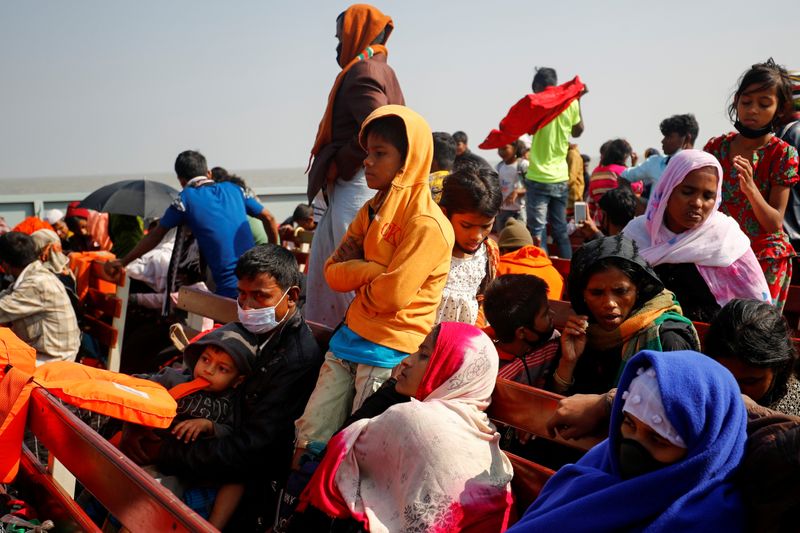By Ruma Paul
DHAKA (Reuters) - A group of more than 1,700 Rohingya Muslim refugees set sail for a remote island in the Bay of Bengal with more readying to go on Saturday, a Bangladesh navy official said, despite concerns about the risk of storms and floods lashing the site.
They are the newest addition to the roughly 3,500 Rohingya refugees from neighbouring Myanmar that Bangladesh has sent to the island of Bhasan Char since early December, from border camps where a million live in ramshackle huts.
"Today we are expecting 1,700-plus people to arrive here," Commodore Abdullah Al Mamun Chowdhury, the officer in charge of the island, told Reuters by telephone on Friday.
More Rohingya who had volunteered to shift to the island were being transferred to the nearest port city of Chittagong from the camps, he added.
"Tomorrow they will be moved to Bhasan Char. All together we are expecting 3,000-plus people," Chowdhury said.
The island, which emerged from the sea just two decades ago, is several hours' journey away from the southern port.
The Rohingya, a minority group who fled violence in Buddhist-majority Myanmar, are not allowed to move off the island without permission from the government.
Bangladesh says the relocation is voluntary, but some of the first group, sent in December, spoke of being coerced.
The government also says overcrowding in camps in the Cox's Bazar district is fuelling crimes, as efforts to return them to Myanmar flounder.
"What options do we have? How long can we live in the crowded camps under tarpaulins?" asked Mohammed Ibrahim, 25, en route to the island where some of his relatives have already been moved.
"This is going nowhere, the way the international community is handling our crisis," he told Reuters by mobile telephone.
Bangladesh has also dismissed flood concerns over the island, citing the building of a 12-km (7.5-mile) -long stretch of embankment that is 2 metres (6.5 feet) high, in addition to housing for 100,000 people, hospitals and cyclone centres.
It has drawn criticism for its reluctance to consult with aid bodies, including the U.N. refugee agency, over the transfers.
The United Nations High Commissioner for Refugees says the agency has not been allowed to evaluate the safety and sustainability of life on the island.

"We look forward to continuing a constructive dialogue with the Government regarding its Bhasan Char project, including the proposed U.N. technical and protection assessments," it said in an email.